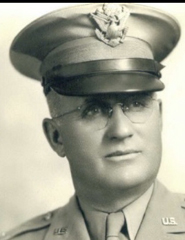MILES RETURNS TO 5TH ARMY
Correspondent Unable to Get to Egypt
By FRANK MILES
(Iowa Daily Press War Corespondent)
With the 5th Army in Italy (IDPA) -- I am "home" again after 18 days of flying, motoring and hiking in 2 continents plus a sightseeing trip on the back of a camel. On the whole the jaunt was pleasant, but circumstances over which I had no control put me through exasperating trials.
Unfortunately or not - an Iowa American with a fairly hot temper - a war correspondent can't get too tough with military and intelligence corps officers. When he can't make himself understood by officials in some countries he gets no satisfaction from letting off steam.
An American correspondent is accredited to a theater of operations by approval of the commanding general. He cannot enter another theater without consent of its commander. If he leaves the theater to which he is accredited without proper authority to return he must be accredited to do so.
I am accredited to the Mediterranean theater, which includes Athens, Greece, it was all right for me to go from here to there without obtaining any official card or paper other than a telegraphic acceptance from the British public relations chief in the Greek capital because Great Britain is in control there.
While I finished my job in Greece, I asked permission to proceed to Cairo, Egypt, which is in the middle east theater. It was granted but because neither the British PRC nor I knew the best way out for fast return to the 5th army in North Italy, he in good faith simply gave me a note to the British PRC at Cairo requesting that my departure when wanted be fully expedited.
That was not enough for the Cairo British PRC, so he turned me over to the American PRC there. That official received me cordially but said he had no authority to send me into the Mediterranean theater because I had nothing to show accreditation in it. Next move was for him to radio AFHQ of that theater to see if I were acceptable there. Of course, he was certain I would be but he had to have it in black and white.
AFHQ has many things other than war correspondents to think about so 4 days elapsed before its answer which was favorable - was flashed back to Cairo.
After that came the problems of arranging air transportation, which usually takes time and involves priorities.
A scribe is always behind military and government officers in the air.
Finally I was told to be at an airfield in near Cairo. I was there ahead of time with the aid of Col. H.E. Pride of Ames.
The plane on which I was to go balked. It couldn't take off. Mechanics worked feverishly. Every hour other prospective passengers and I were told we'd depart in another hour. At 6 a.m. one Sunday morning we were regrettably informed that our ship would not leave until 3 a.m. Monday.
My hitch hiking instincts surged. I recall that in the airport the evening before I had met 2 army officers who told me they were in a group on a special mission in that sector which came there in a C-47. I found the brigadier general and colonel in first and second command and asked if I could leave with them on Sunday. They put it up to the pilot, a handsome young captain, who said okay promptly.
We expected to be on our home base the following afternoon but were delayed a day by engine trouble at Athens, then another day by a terrific storm near Naples, Italy, in which the captain displayed remarkable skill at the controls. Inky black clouds, tornadic winds, Niagara falls downpour and sheets of lightening made a rider of a tossing, plunging plane wonder why he left the ground, but the captain, steady as the proverbial clock and wearing a grim smile, made an air field and let the craft down perfectly.
I didn't get sick to my stomach possibly because I was a sailor in the last war -- but I was scared.
Source: Mason City Globe-Gazette, January 2, 1945
![]()

